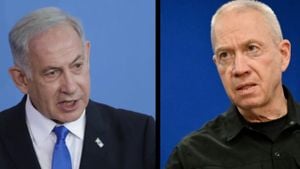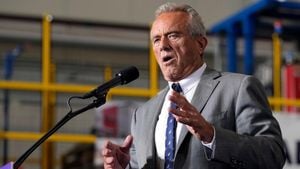Former President Donald Trump's nomination of Chris Wright, the CEO of Liberty Energy, as Secretary of Energy is sparking intense debate and interest across the political spectrum. This appointment marks not only the selection of a significant figure within the fracking industry but also sets the stage for discussions about energy policies under Trump's potential second term. Wright, who has been touted as innovative within the realms of energy technology, has publicly dismissed the narrative of a looming climate crisis, significantly diverging from mainstream scientific consensus and environmental advocacy.
Wright, who has been at the forefront of the fracking revolution, is lauded as one of the pioneers of the American shale industry. Trump remarked on the nomination, stating, “Chris has been a leading technologist and entrepreneur in Energy.” This reflects Wright’s background as someone deeply entrenched not only in oil and gas but also with experience across various sectors such as solar and nuclear energy. His approach to energy focuses on maximizing the country's resources without predominantly shifting to renewable avenues—a perspective he strongly argues can help alleviate poverty globally.
The nomination is already drawing scrutiny from climate activists and advocacy groups. The Sierra Club's Executive Director Ben Jealous has asserted, “Not since Donald Trump’s most recent cabinet pick has a nominee been so utterly unqualified for the job,” calling Wright a climate denier who has profited from polluting enterprises. Critics are rightfully concerned due to Wright's past comments downplaying climate change, stating, “There is no climate crisis.” His public image has been bolstered by his advocacy against stringent climate policies, which he claims restrict energy production and drive costs up for consumers.
Accompanying Wright's nomination is the appointment of North Dakota Governor Doug Burgum as Secretary of the Interior, who is set to lead the newly formed National Energy Council. This council includes all federal departments involved with energy generation, permitting, distribution, and regulation. Trump's administration is shaping up to champion what can be characterized as "energy dominance" by reinstalling figures who advocate for fossil fuel extraction and broader energy production capabilities. Trump, acknowledging the scope of the nominations, commented, “We will DRILL BABY DRILL and expand ALL forms of energy production to grow our economy.” This sentiment echoes throughout his energy policy vision—an agenda driven by maximizing domestic fuel output.
Wright is also involved with Oklo, Inc., a tech company aiming to innovate within the nuclear sector through advanced modular reactor technology. His connection with both nuclear and conventional energy pursuits highlights Trump's inclination to pursue multifaceted energy strategies, aimed at capturing support from varying industry sectors. Wright's references to nuclear energy simply underpin his goal of diversifying the energy portfolio, yet his historical opposition to the prevailing climate change narratives brings concern about potential shifts in energy policy toward fossil fuel dependence.
While Wright is seemingly poised to play significant roles steering both renewable support and traditional fossil fuel extraction, environmentalists maintain skepticism about the feasibility of beneficial policy outcomes. Critics maintain some level of trepidation about how these appointments might interact with legislative measures for reducing greenhouse gases. Trump's prior administration's legislative actions, including the withdrawal from several international climate agreements, suggest a potential rollback on progress made under previous administrations focused on climate action.
Beyond the immediate appointments, Trump's administration is contending with the broader narrative of green energy transitioning vis-a-vis fossil fuel reliance. Experts and commentators are expressing their thoughts on how this direction might not only imply support for renewables, even indirectly, but also how it may ignite renewed discussions about the relevance of climate science and public policy on energy.
While traditional energy production remains fundamental, Wright’s remarks on the energy sector's necessity, particularly for developing nations, align with arguments posing fossil fuels as instrumental for alleviating poverty. He elaborates on this topic, stating, “The world runs on oil and gas, and we need it,” which raises poignant questions about the balances governments seek to strike between development and environmental stewardship. His proponents suggest this could lead to innovative collaborations across sectors intended to sustain energy production and address environmental impacts, but opponents regard it as potentially ignoring urgent climate needs.
Through the lens of current political dynamics, Trump’s nominations for Wright and Burgum signal intentions to embrace familiar stances on energy production, leaning heavily on coal, oil, and gas, which promise immediate economic growth but challenge long-term climate health. Consumer perspectives on rising energy costs fueled by policy shifts under Wright’s potential leadership will undoubtedly influence subsequent political narratives surrounding energy reliability and affordability. Amidst the energy crisis spurred by austerity measures and geopolitical tensions, the incoming energy policies present pivotal decision points focused on security and sustainability.
The discussions stemming from these nominations will likely shape energy marketplaces and governmental financing mechanisms, including the future of investment approaches toward both conventional and renewable energy resources within the United States. Wright’s leadership could also underline the roadmap for transitioning existing projects under the Trump administration’s vision for America's energy future.
Looking forward, those watching Trump's second-term administration will focus on how energy policies might shift already established ecologic frameworks as Wright and Burgum step to the forefront of the Department of Energy and the Department of Interior, respectively. The choices they make could evoke challenges concerning regulatory landscapes and directly affect the pace at which the U.S. engages with global climate obligations.



